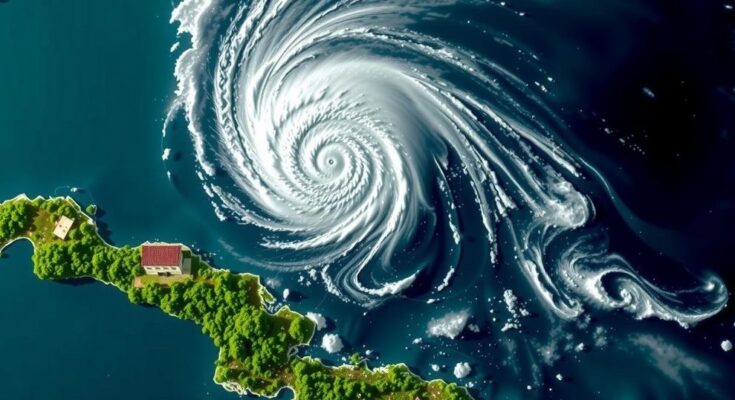Cuba is facing its third consecutive day without power due to a series of nationwide blackouts, exacerbated by the arrival of Hurricane Oscar, which is expected to impact recovery efforts. The grid’s frequent failures have plunged residents into crisis as essential services rely on electricity. Protests arise amid frustrations over food shortages and lack of support from traditional allies.
As of Sunday, millions of Cubans are enduring their third consecutive day without electricity following unsuccessful efforts to restore power overnight. The Cuban Electrical Union reported that approximately 16% of the national grid had been restored before it succumbed to overload once again on Saturday night. Officials remain silent regarding a timeline for full restoration of services. This incident marks the third nationwide power failure since Friday, leaving the vast majority of the country’s ten million citizens without electricity. Complications in recovery efforts arise with the imminent approach of Hurricane Oscar, which is expected to deliver strong winds and rough surf to eastern Cuba. The storm has already made landfall on Inagua Island in The Bahamas and carries maximum sustained winds estimated at 80 mph. Meteorologists predict that Hurricane Oscar will reach Cuba’s northeastern coastline later today, although it is expected to weaken thereafter. However, it may still maintain tropical storm status as it moves northward from Cuba into the central Bahamas on Tuesday. The initial nation-wide blackout occurred on Friday due to the failure of one of Cuba’s major power plants, as reported by the energy ministry. Though officials initially announced that power restoration was underway, a second blackout struck on Saturday morning, exacerbating the nation’s existing woes. The loss of electricity poses a severe threat to daily life, particularly regarding water supply and food preservation, both of which are heavily reliant on a stable power supply. Residents of Havana have experienced long lines while seeking basic necessities such as bread. Individuals have turned to WhatsApp groups to share updates regarding power availability and have coordinated efforts to preserve medications reliant on refrigeration. Despite the trials faced by locals, tourists continue to explore Havana in classic 1950s automobiles, although many hotels are facing fuel shortages for their backup generators. Reports also indicate that José Martí International Airport in Havana is functioning solely on emergency power, leading to disruptions in ticketing and a lack of air conditioning. In response to growing discontent, small protests have emerged across the island. Cuban leaders attribute the escalating energy crisis to a convergence of multiple factors, including intensified U.S. economic sanctions, damage inflicted by recent hurricanes, and the deteriorating state of the nation’s infrastructure. In a previously delayed televised statement, Prime Minister Manuel Marrero Cruz revealed, “We have been paralyzing economic activity to generate (power) to the population,” indicating the extent of the crisis. Meanwhile, Health Minister José Angel Portal Miranda confirmed that health facilities are relying on generators to maintain essential services during this challenging period.
The ongoing energy crisis in Cuba has led to significant political and social unrest, particularly as the country grapples with an aging infrastructure and heightened economic sanctions from the United States. Frequent hurricanes have exacerbated the struggles faced by this island nation. With Hurricane Oscar approaching, the situation has intensified, emphasizing the urgent need for reliable electricity to support not only daily living but also crucial health services. Historically, Cuba has depended on alliances with countries like Venezuela and Mexico for essential resources, further complicating current recovery efforts.
The persistent power failures in Cuba, now compounded by the threat of Hurricane Oscar, illustrate the fragility of the country’s energy infrastructure. With citizens struggling for access to essential resources and some expressing their frustration through protests, the government faces mounting pressure to address the crisis. The challenges presented not only hinder daily life but also pose a significant risk to health services, emphasizing the dire need for systematic improvements in the energy sector.
Original Source: www.cnn.com




